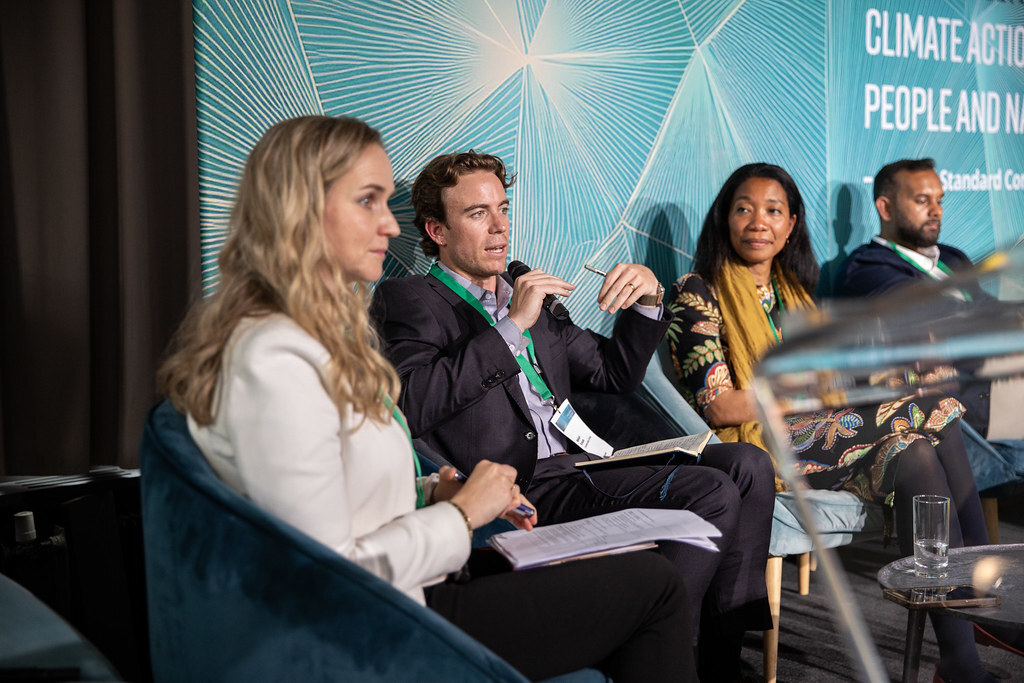
Banking on nature: Strategies to scale investment in nature-based climate solutions
CrossBoundary’s Natural Capital team joined climate experts, nature project developers, and corporate sustainability leaders for Gold Standard’s Climate Action for People and Nature Conference in Paris.
CrossBoundary’s Natural Capital team joined climate experts, nature project developers, and corporate sustainability leaders for Gold Standard’s Climate Action for People and Nature Conference in Paris.
Principal and Co-head of Natural Capital Advisory, Makari Krause, contributed to a session exploring financing tools and strategies for nature projects. The panel covered the entire project lifecycle from early-stage development to large-scale implementation, as well as the roles that different investors can play in advancing project finance.
Drawing from experience structuring project financing for nature-based solutions, here’s what Makari shared:
Nature project financing follows a predictable risk-return evolution
Projects progress through three distinct phases with decreasing risk, expanding investor pools, and decreasing cost of capital. The pre-feasibility stage involves the first capital into a project and requires $50,000-$300,000 in high-risk capital, typically from the developer’s own balance sheet. Many projects, particularly from small or first-time developers, struggle to secure this critical initial funding.
The Project Design Document phase sees capital requirements increase to $200,000-$2 million as projects become derisked through feasibility assessments. Risk-tolerant investors like carbon funds enter during this phase, enabling early-stage offtake agreements as projects refine financial projections and register with the applicable standards.
Implementation phase: Projects have been registered and are ready for significant investment, usually capital expenditure, into implementation. Project feasibility and validation risks have been reduced, enabling financing from diverse sources beyond carbon funds. CrossBoundary’s vision is that this phase starts to look like more traditional infrastructure finance, where you have equity and senior debt in the project SPV backed by a bankable offtake agreement.
Improving bankability requires a strategic approach to returns and risk
Makari highlighted two key strategies:
-
- Increasing returns by aligning with the latest high-integrity carbon standards and following industry best practices
- Reducing or mitigating risks where possible, then utilizing tools to reallocate or transfer any remaining risk you don’t want to own. Tools like parametric insurance for weather-related risks and political risk insurance are worth considering.
Benefit distribution must consider all stakeholders’ opportunity costs
Makari emphasized that while the goal should always be to grow the project’s economic “pie,” developers will still need to split that pie between participants. During project structuring, the most important thing to keep in mind is that all participants have an opportunity cost of participating and some hurdle rate, whether implicit or explicit.
Understanding this opportunity cost and hurdle rate is straightforward with investors but may require a more nuanced approach with host country governments and local communities. This requires following best practices for Free, Prior, and Informed Consent (FPIC) and thoughtfully designing benefit-sharing plans to ensure that everyone receives a fair return on their investment and opportunity cost.
Fair value distribution is becoming non-negotiable for project success
In conclusion, ensuring everyone receives fair returns on their investment and opportunity costs is fundamental to sustainable project development. As nature project finance continues to mature, strategic risk management and equitable benefit-sharing will be essential for scaling nature-based climate solutions.
CrossBoundary delivered a masterclass on Project Finance for Project Activities as part of Gold Standard’s Masterclass Series. Download resources from the session below:



